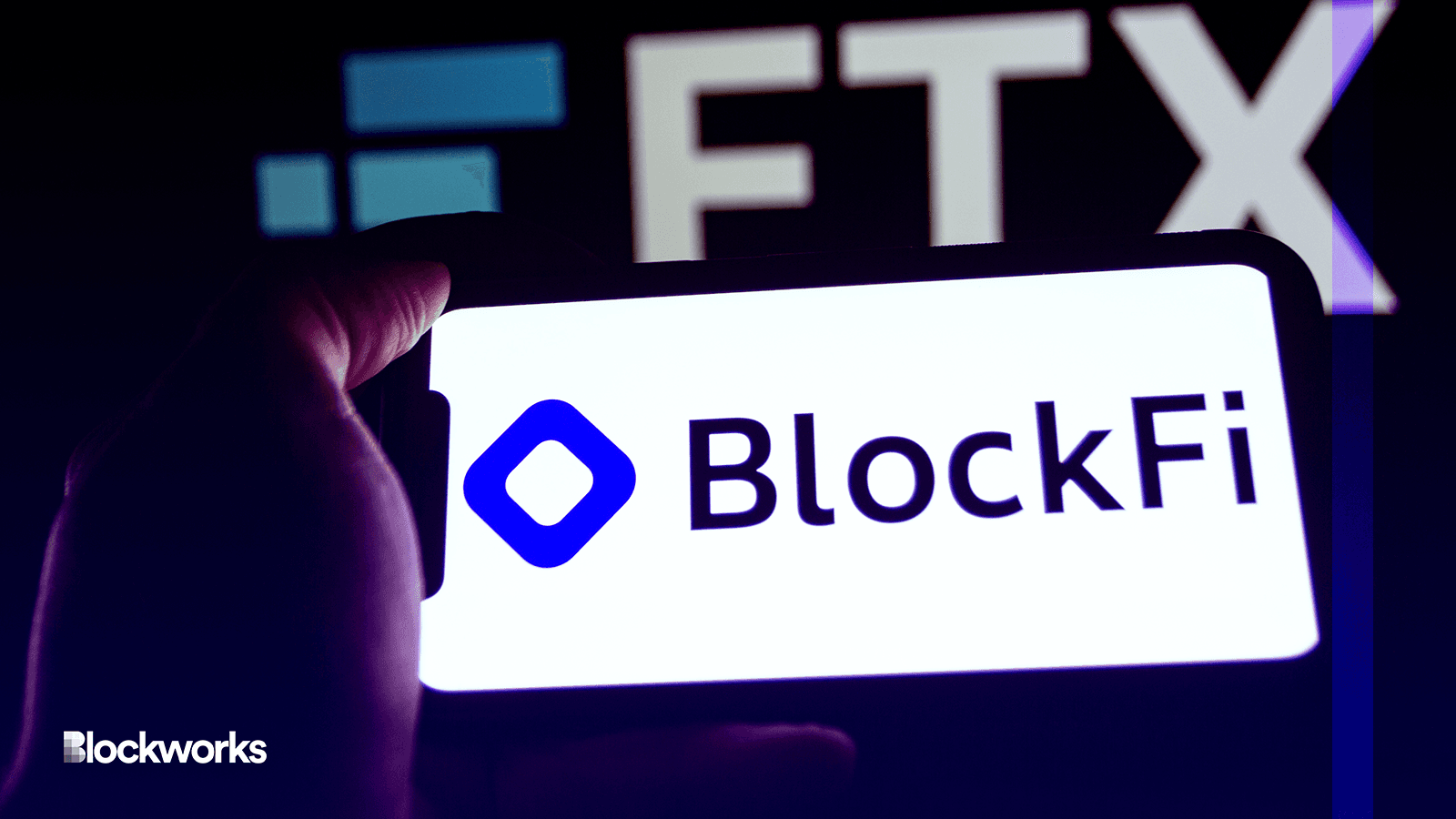BlockFi’s ‘reliance’ on Alameda, FTX led to ‘foreseeable losses’ – filing
BlockFi’s “demise was rooted in business practices and decisions well preceding” the bankruptcies of Alameda and FTX, a report found

Rcc_Btn/Shutterstock modified by Blockworks
Less than a week after FTX filed for bankruptcy in 2022, BlockFi allegedly moved to convert $239 million of customer crypto into fiat in a “self-interested” attempt to avoid increasingly likely liability.
The finding is one of a number of notable takeaways from a new investigation undertaken by BlockFi’s committee of unsecured creditors. It found that, despite Blockfi’s attempts to differentiate itself from other failed crypto lenders, the company, too, had engaged in questionable business practices.
The 92-page report filed Friday found that — with the exception of a single month — BlockFi did not generate positive operating income since its inception. The risk management department also brought up concerns related to Alameda’s lending and Blockfi’s failure to perform basic due diligence on both Alameda and FTX.
Here are five takeaways from the report.
BlockFi was aware of Alameda lending risks
BlockFi’s risk management department is said to have warned of risks related to Alameda’s loans, “largely collateralized” by FTX’s native token FTT.
“BlockFi’s reliance on Alameda/FTX led to foreseeable (actually foreseen) losses of a staggering quantum,” the report states. FTX and Alameda defaulted on around $680 million in collateralized loan obligations.
In August 2021, BlockFi’s credit risk team allegedly drafted an internal memo regarding Alameda, warning that the firm “wrong-way risk, had unaudited financials, relied on illiquid tokens, and was offering volatile collateral.”
Following the memo, former CEO Zac Prince “expressed interest” in doing more business with Alameda, per the report.
Read more: BlockFi’s UCC claims former CEO Zac Prince ‘personally profited’ from company
There was dissent. Former Chief Risk Officer Rene van Kesteren was “uncomfortable with the risk profile presented by additional FTT as collateral,” the report states.
Still. Prince ”pushed to increase exposure to (and revenue from) Alameda by allowing Alameda to use FTT as collateral, despite concerns from the risk management team regarding its illiquidity,” the report said.
The investigation found BlockFi could have walked away from Alameda and FTX in June 2022 — leaving “nearly all” customer deposits intact.
BlockFi failed to properly vet FTX, Alameda
BlockFi purportedly failed to do proper due diligence on two crucial, and ultimately catastrophic, counterparties: FTX and Alameda.
The report faulted BlockFi for failing to “complete basic due diligence” on both companies, with hundreds of millions of loans at stake.
Sam Bankman-Fried, the report said, failed to complete BlockFi’s baseline security questionnaire back in 2021, prompting a push from Prince to cement BlockFi as a “very large lender and trade on your platform.”
Following concerns, per the report, raised by co-founder Florencia Marquez, around FTT Alameda loans, Prince said the company “already had risk to FTX,” but there was an enticing tradeoff: BlockFi was making $4.5 million a month in FTT staking rewards.
BlockFi co-founder implied BlockFi funds were FDIC insured
Though BlockFi was never federally regulated, and though none of its accounts were FDIC-insured, “it presented itself as almost akin to a regulated, insured hometown community bank,” the report said.
Positioning BlockFi as “akin” to a bank echoes a similar claim to the one rendered in the CFTC’s lawsuit against Celsius last week.
In BlockFi’s case, Marquez implied that, since Gemini was Blockfi’s primary custodian, customer funds were FDIC insured. They were not.
Speaking on a podcast in 2019, Marquez said, “When you’re depositing your crypto with BlockFi you’re sending it directly to Gemini so when you click deposit it’s actually generating a wallet address for you directly on Gemini which is our third-party custodian. They are a licensed custodian and they’re regulated by the NY DFS. Gemini does have FDIC insurance on their cash deposits.”
But BlockFi allegedly placed customer deposits on Gemini’s exchange, not Gemini Trust Company, which is neither a bank nor FDIC-insured.
Loan portfolio heavily undercollateralized
BlockFi did not diversify its loan portfolio as it claimed, with both Prince and Marquez claiming BlockFi “subjected its institutional clients to a rigorous underwriting process,” the report said.
“BlockFi’s portfolio was dominated by crypto-centric firms who, one-by-one, led BlockFi down a foreseeable (and foreseen) path to financial ruin,” the report stated.
The portfolio was heavily concentrated with both undercollaterized borrowers, such as bankrupt crypto hedge fund Three Arrows Capital, and weak collateral from firms including Alameda.
The book purportedly did not include “financial institutions’ with ‘other forms of revenue coming’ beyond ‘crypto trading strategies.’”
Questionable BlockFi transactions
Prior to filing for bankruptcy in November 2022, BlockFi converted $239 million of US customers’ crypto to fiat, with the sale said to occur “at a moment of extreme market dislocation.”
“Even from a bankruptcy process standpoint, the decision is questionable: Under no reasonable circumstances could the administrative costs of this bankruptcy even remotely approach $239 million,” the report said.
Furthermore, the sale was tied to “self-interested attempts” to protect executives and board members from potential liability, the report claims.
Days after the $239 million liquidation, and “ten days prior to filing for bankruptcy, BlockFi spent approximately $22.6 million to purchase a $30 million D&O insurance policy, including a six-month tail allowing additional time to assert claims under previous insurance coverage,” the report found.
Directors and Officers insurance is a liability insurance taken out to protect individuals from personal losses if they are sued because they were an officer or director at a company.
Get the news in your inbox. Explore Blockworks newsletters:
- The Breakdown: Decoding crypto and the markets. Daily.
- 0xResearch: Alpha in your inbox. Think like an analyst.






